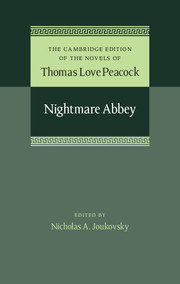Book contents
- Frontmatter
- Contents
- List of Illustrations
- General Editor’s Preface
- Acknowledgements
- Chronology
- List of Abbreviations
- Introduction
- Nightmare Abbey
- Appendix A Peacock’s Preface of 1837
- Appendix B An Essay on Fashionable Literature (1818)
- Appendix C The Four Ages of Poetry (1820)
- Note on the Text
- Emendations and Variants
- Ambiguous Line-End Hyphenations
- Explanatory Notes
- Select Bibliography
Chapter IX
Published online by Cambridge University Press: 30 June 2022
- Frontmatter
- Contents
- List of Illustrations
- General Editor’s Preface
- Acknowledgements
- Chronology
- List of Abbreviations
- Introduction
- Nightmare Abbey
- Appendix A Peacock’s Preface of 1837
- Appendix B An Essay on Fashionable Literature (1818)
- Appendix C The Four Ages of Poetry (1820)
- Note on the Text
- Emendations and Variants
- Ambiguous Line-End Hyphenations
- Explanatory Notes
- Select Bibliography
Summary
SCYTHROP grew every day more reserved, mysterious, and distrait; and gradually lengthened the duration of his diurnal seclusions in his tower. Marionetta thought she perceived in all this very manifest symptoms of a warm love cooling.
It was seldom that she found herself alone with him in the morning, and, on these occasions, if she was silent, in the hope of his speaking first, not a syllable would he utter: if she spoke to him indirectly, he assented monosyllabically: if she questioned him, his answers were brief, constrained, and evasive. Still, though her spirits were depressed, her playfulness had not so totally forsaken her, but that it illuminated, at intervals, the gloom of Nightmare Abbey; and, if, on any occasion, she observed in Scythrop tokens of unextinguished or returning passion, her love of tormenting her lover immediately got the better both of her grief and her sympathy, though not of her curiosity, which Scythrop seemed determined not to satisfy. This playfulness, however, was in a great measure artificial, and usually vanished with the irritable Strephon, to whose annoyance it had been exerted. The Genius Loci, the tutela of Nightmare Abbey, the spirit of black melancholy, began to set his seal on her pallescent countenance. Scythrop perceived the change, found his tender sympathies awakened, and did his utmost to comfort the afflicted damsel, assuring her that his seeming inattention had only proceeded from his being involved in a profound meditation on a very hopeful scheme for the regeneration of human society. Marionetta called him ungrateful, cruel, cold-hearted, and accompanied her reproaches with many sobs and tears; poor Scythrop growing every moment more soft and submissive,—till, at length, he threw himself at her feet, and declared, that no competition of beauty however dazzling, genius however transcendent, talents however cultivated, or philosophy however enlightened, should ever make him renounce his divine Marionetta.
“Competition!” thought Marionetta, and suddenly, with an air of the most freezing indifference, she said, “You are perfectly at liberty, sir, to do as you please: I beg you will follow your own plans, without any reference to me.”
Scythrop was confounded. What was become of all her passion and her tears? Still kneeling, he kissed her hand with rueful timidity, and said, in most pathetic accents, “Do you not love me, Marionetta?”
- Type
- Chapter
- Information
- Nightmare Abbey , pp. 58 - 62Publisher: Cambridge University PressPrint publication year: 2016

